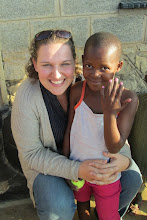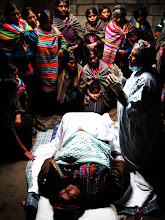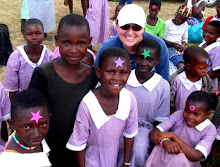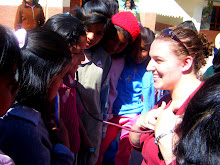I can hardly believe I waited so long to write about food! It's a topic that nearly everyone back home is curious about, and it's certainly a "hot topic" conversation and morale booster in the Peace Corps community! So let's talk about lijo tsa Basotho (Basotho food)...
As a traditionally (and still mostly) agrarian society, Basotho are almost entirely dependent on several "staple" foods that are able to be grown in this mountainous terrain and arid climate. The most important and prolific crop is, without a doubt, maize (corn.) The vast majority of maize produced by subsistence farmers (such as my host father, Ntate Bereng) is ground into maize meal called, papa. To make papa, fine powdery white maize meal is added to boiling water, and turned with a long wooden stick until it's very dense. It's somewhat akin to grits in the southern US, except it's a finer ground consistency and it's cooked until it's very stiff. And let me tell you, it's ALL about papa, papa, papa in Lesotho... Nearly every Basotho I know will eat it for breakfast, lunch and dinner, 24/7, 264 days a year. In a tradition that I find utterly baffling, it is rarely cooked with any additions or seasonings- not even a little salt or butter. And suggesting they "mix it up" a little by doing so never fails to illicit laughter or shocked looks. :)
"Bland" papa is okay, however, because papa is nearly always paired with a very salty or savory side dish… Common papa pairings are cooked morroho (spinach, cabbage, or rape greens), nama ea khoho (chicken), nama ea khomo (beef), chakalaka (a spicy vegetable dish traditional to southern Africa), mahe (scrambled eggs), or linaoa (beans). All of the above dishes tend to be VERY salty and/or oily. Eating is normally done with your hands… The papa is packed tightly into small mounds with the fingers, and then used to scoop up some of the side dish with it. So each bite flavors the papa. While adults prefer savory and salty papa accompaniments, children love "papa le lebese" (papa with milk). It's comfort food for kids "Basotho style".. Just think "mac and cheese" or PB&J in America. :)
In the absence of papa, Basotho also commonly substitute with rice, samp (another form of cooked maize, similar to hominy), or bohobe (steam bread.) Bohobe is baked in giant metal pots, left to slowly bake over slow-burning fires or paraffin heaters. It's slightly sweet and is leavened with yeast, to make a very dense white bread. It's simple to make and incredibly filling. Other common side dishes in Basotho cuisine include mokopu (pumpkin, squash, ect.), and lihoete (carrot) or beet salad, made with LOTS of tangy mayonnaise.) Desert, although not common in many traditional households, is almost always a baffling combination of jello and custard… Don't ask. I have yet to discover why they can't be served separately. Ha! In a classic British tradition, biscuits (more akin to savory cookies or scones for Americans) are also typically paired with the custard jello for desert… And sometimes even found crushed up in it! Delightful, right?!
Most families in rural areas, such as my village, are subsistence farmers. This means they literally produce their own food supply, and what outside supplies they do need to purchase, they do by selling or trading their harvested crops. Most families (if wealthy enough,) raise cattle, chickens, sheep, goats, or the occasional hog for meat. The prevalence of subsistence farming, however, means that food supply and diversity is incredibly seasonal in Lesotho... During the summer months (Dec- Feb) food is abundant... Family gardens overflow, and maize is picked fresh out of the fields to be roasted as poone (corn on the cob) over open fire pits. Peaches literally overflow on trees. Everyone in the village eats well and goes to sleep with full bellies.
By mid winter (June- Aug), however, food supplies begin to dwindle. The strain to ration becomes more apparent, especially in the orphans, or children from very poor families, that attend my school. Families may only serve one meal a day to make winter stores last longer. As maize supplies dwindle, there is also a seasonal shift in the kinds of foods serves. Sorrghum is another common field crop in Lesotho, and during the winter months it often replaces papa in the diet. A common "winter dish" in Lesotho is called nyekoe. Nyekoe is a hot, thick stew made of sorrghum and linaoa (beans). In the winter, it is cooked in giant black cauldrons over outdoor cookfires... And on a chilly evening, it's a little bit of home-stewed goodness, “Basotho-style.” Given the cold weather, winter is also the preferred time for butchering livestock... So nama ea khomo (beef), which is typically very expensive (and thus not commonly eaten) during summer months, tends to be more prevalent during the winter months.
But no matter what time of the year... Three things always be an indulgence in the Basotho diet: joala tsa Basotho (home-brewed Basotho beer), nama (meat), and lipompom (sweets.) That's because both joala, nama, and lipompom are luxuries that many family can't (or at least shouldn't, in the case of joala) indulge in. They're simply more expensive. Joala is often brewed cheaply by village bo-'Me, out of wheat and whatever fruit happens to be in season (ie cheap)... And trust me, it’s an acquired taste that will knock you out if you’re not prepared for it! Ha! You can always tell when there's a fresh batch of joala to be had around the village. If not from the noisy, drunken groups of bo-Ntate gathered outside some family's compound, then from the colored white or yellow flags hoisted above the house that advertise that fresh-brewed joala is for sale!
I’ve come to enjoy cooking and eating many Basotho dishes during my time in Lesotho… And while I perceive Basotho food culture as being notably lacking in diversity or creativity in Lesotho, I also understand that food fills a very egalitarian role in Basotho culture. It’s a necessity. And enjoying a diversity of foods, or experimenting with creativity in new combinations or recipes is really not something that occurs here, because it’s a luxury that many of my Basotho friends and neighbors can’t afford. Food is carefully rationed, cooked in traditional ways, and hugely appreciated as a necessity of life. Even so, I thoroughly enjoy participating in “Basotho food culture…” Which means I eat a whole lots of papa, papa, papa! :)
With Love from Lesotho… –Mary E.

 During PST, modeling our new seschweschwe that ‘Me’ made!
During PST, modeling our new seschweschwe that ‘Me’ made! 


























